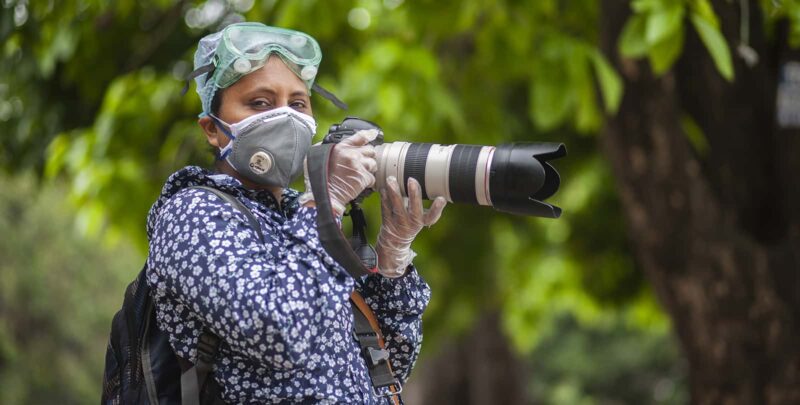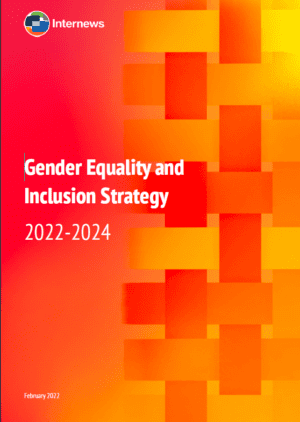As we mark this year’s International Women’s Day, new and emerging challenges continue to prevent the achievement of gender equality globally. At Internews, we are acutely aware that many of these challenges are related to how information is produced, disseminated, and consumed: whose views, solutions, needs, and priorities shape the news; who counts as experts and newsworthy subjects; whose perspectives set and influence public policy agendas; and who has safe access to information that matters to their lives.
“Women and gender minorities are underrepresented in every aspect of media production.”
The voices and perspectives of women and gender minorities are underrepresented in every aspect of media production, circulation, and consumption. According to global research conducted by the Global Media Monitoring Project in 2020, on average, women are only 25% of those seen, heard, and read about in news stories, and 24% of the expert sources quoted by the news media. The silencing of women’s voices contributes to a culture that devalues women and girls while reinforcing harmful gender norms. While in many regions women are increasingly entering the field of journalism and forging their own paths to media ownership in digital spaces, they remain chronically underrepresented in leadership positions, particularly in traditional media.
When it comes to online spaces, women and gender minorities, especially journalists and those conducting public-facing work or rights-based activism, face a barrage of threats and attacks. Online gender-based violence and gendered disinformation (false, misleading, or harmful content that exploits gender inequalities or invokes gender stereotypes and norms, including to target specific individuals or groups) lead to self-censorship among journalists, disempower leaders and activists, increase offline threats and physical attacks, and ultimately devalue lives and weaken democracies.
An unheard voice is an unheard story #BreakTheBias
On this International Women’s Day, Internews reasserts its commitment to challenge discriminatory gender norms and advance equality across gender identities in the media and information sector. We have just updated our gender equality and inclusion strategy, to reflect our ongoing commitment to equality inclusive of gender and sexual minorities. The strategy mirrors Internews’ mission: to support healthy information environments for all.
“When the media reports on the struggles and successes of a woman, in any field, then other women learn from this coverage: it’s like a road map for them to follow.”
– Clara Matimo, Tanzanian Journalist, in Reflect Reality, an Internews methodology to increase sourcing of women experts in the news.
Reflecting the perspectives, priorities, information needs, and expertise of women and gender minorities in the media is not only a matter of fairness; it’s a key component of good journalism, it builds trust and relevance with the audiences, it boosts media revenue, and it’s fundamental to building better societies.
“The media cannot profess to be the guardian of public interest if it does not consciously, aggressively and proactively articulate and give due representation of women’s interests in news.”
– Adnan Rehmat, Media and Rights Activist in “Where are the Women?”, a research report by Internews’ Earth Journalism Network (EJN) about the missing perspectives of women in environmental reporting.
Internews understands that effective gender transformation requires changes at individual, community, institutional, and policy levels. While we are proud of the work we do, we also understand that we need to do more.
#BreakTheBias, today!
We can all start today by asking: “Does my work help #BreakTheBias, and if not, what do I need to do to revise it, so it does?” We encourage you to check out gender equality research and resources produced by Internews, our partners, and colleagues in the industry; support local women-led outlets and/or those championing gender equality issues; and make use of the tools and strategies available in the Reflect Reality toolkit – such as a collection of databases of women experts per region and strategies to ensure gender parity in your reporting.
Paula Orlando is a Senior Program Officer for Knowledge and Gender at Internews.

